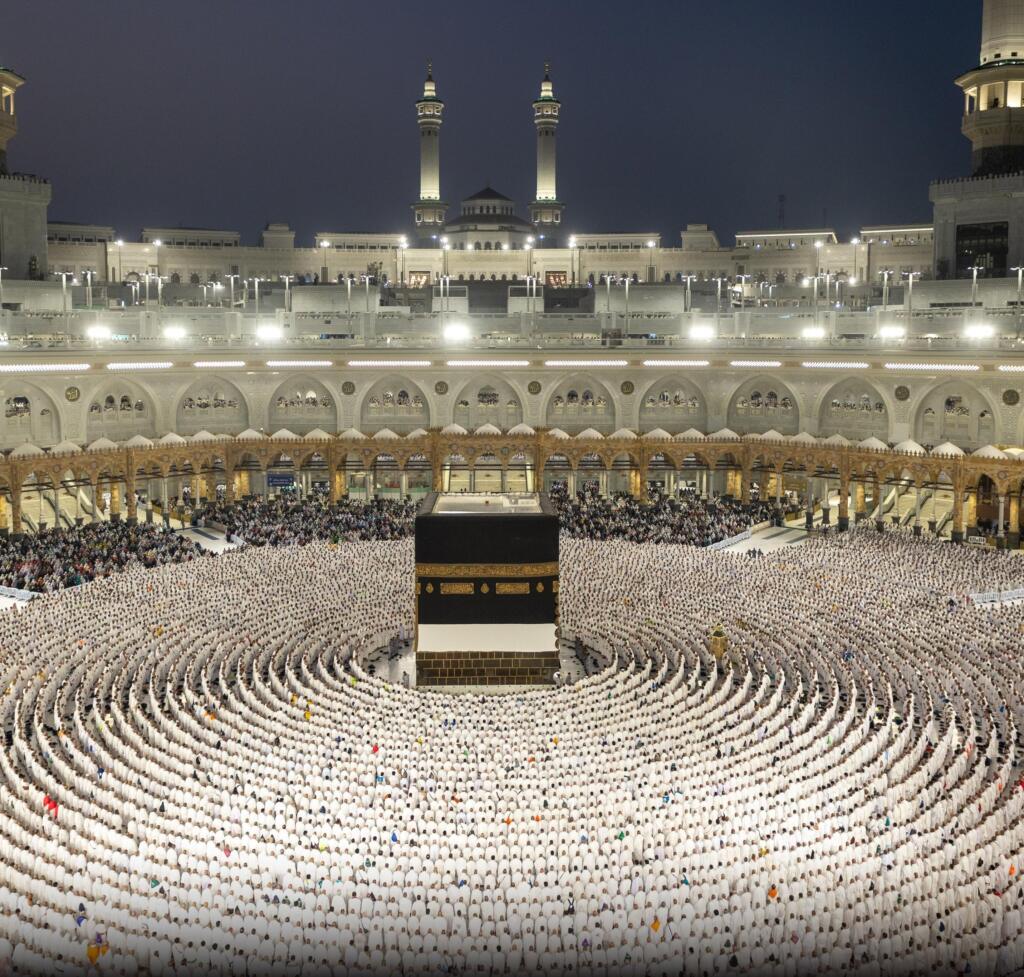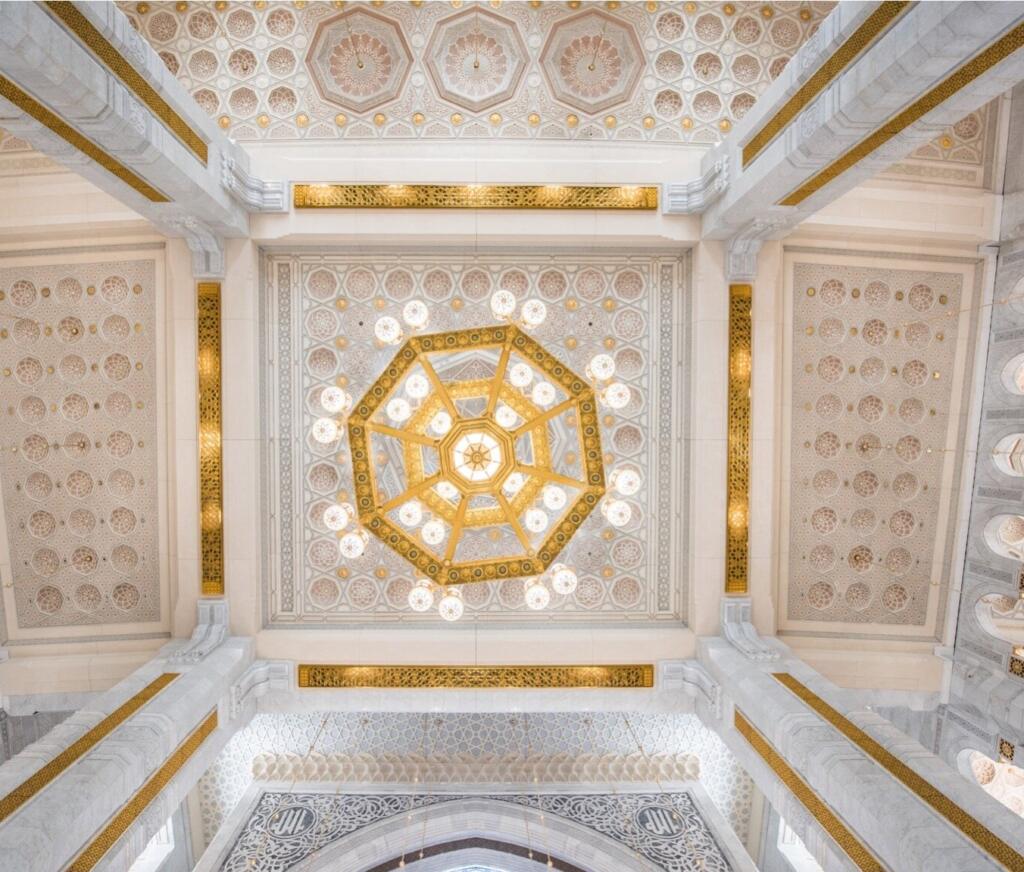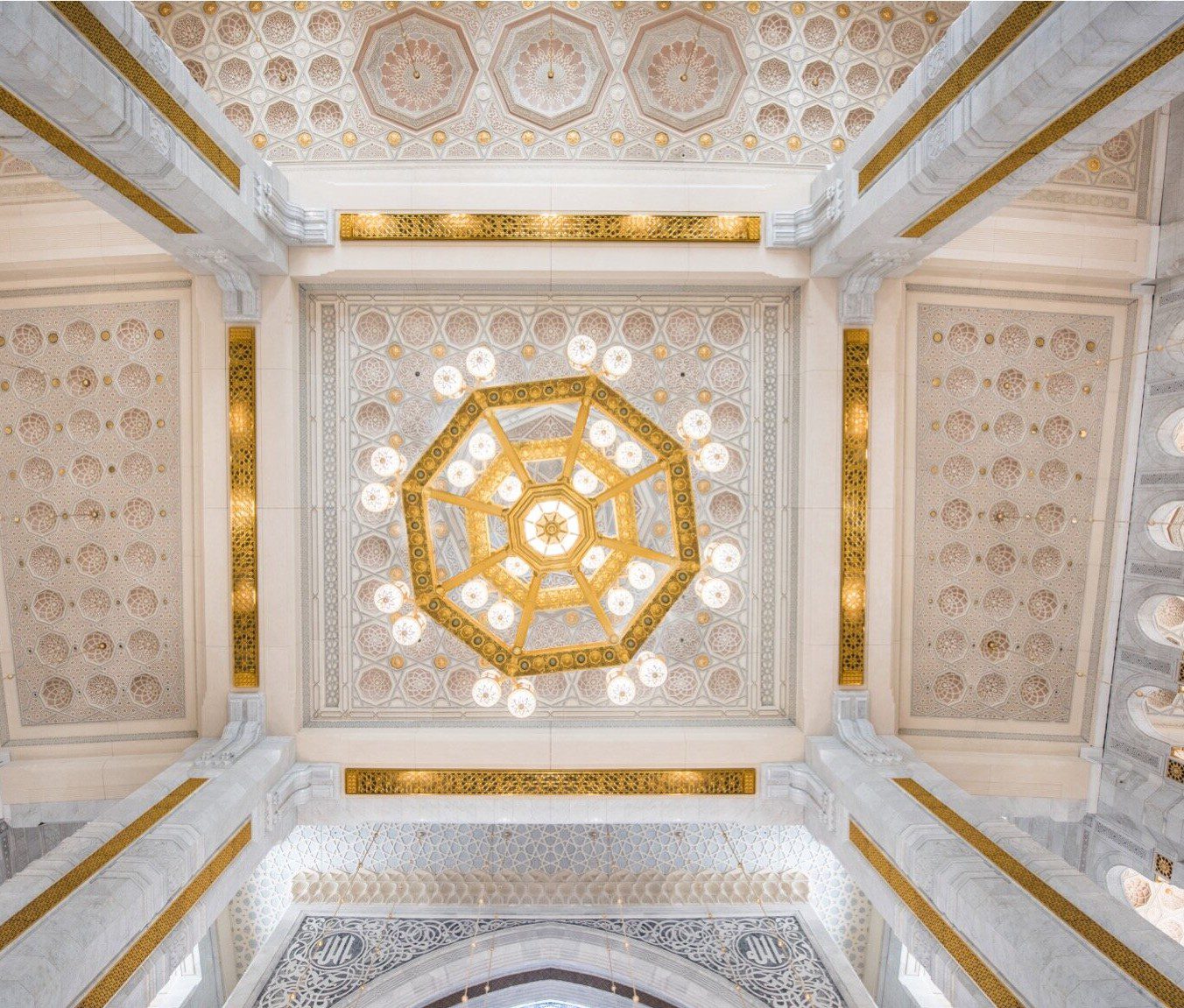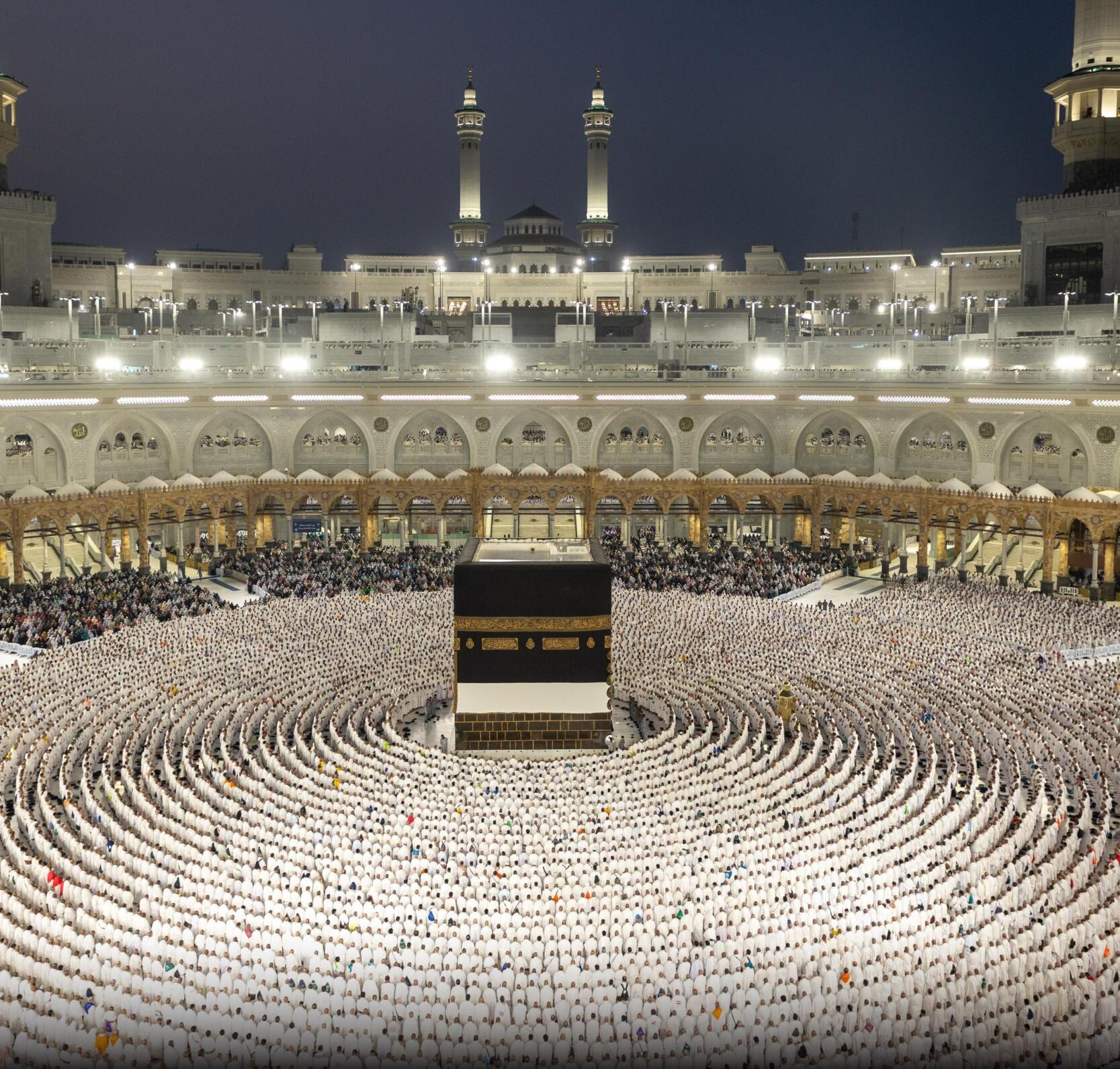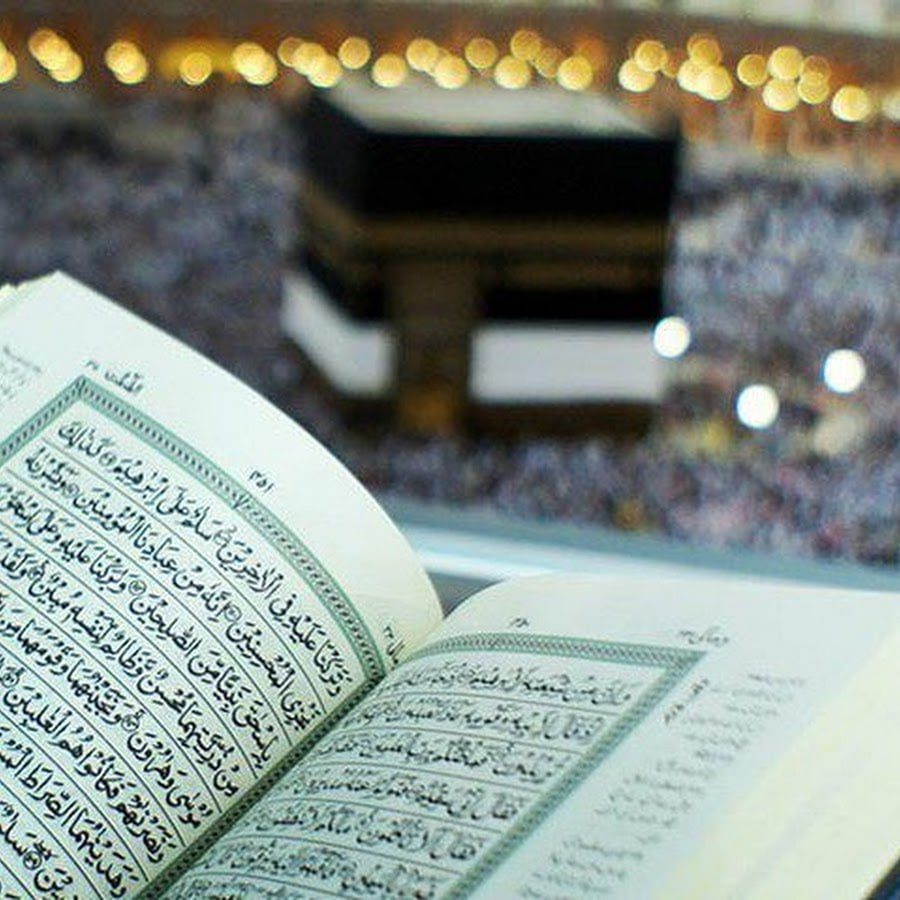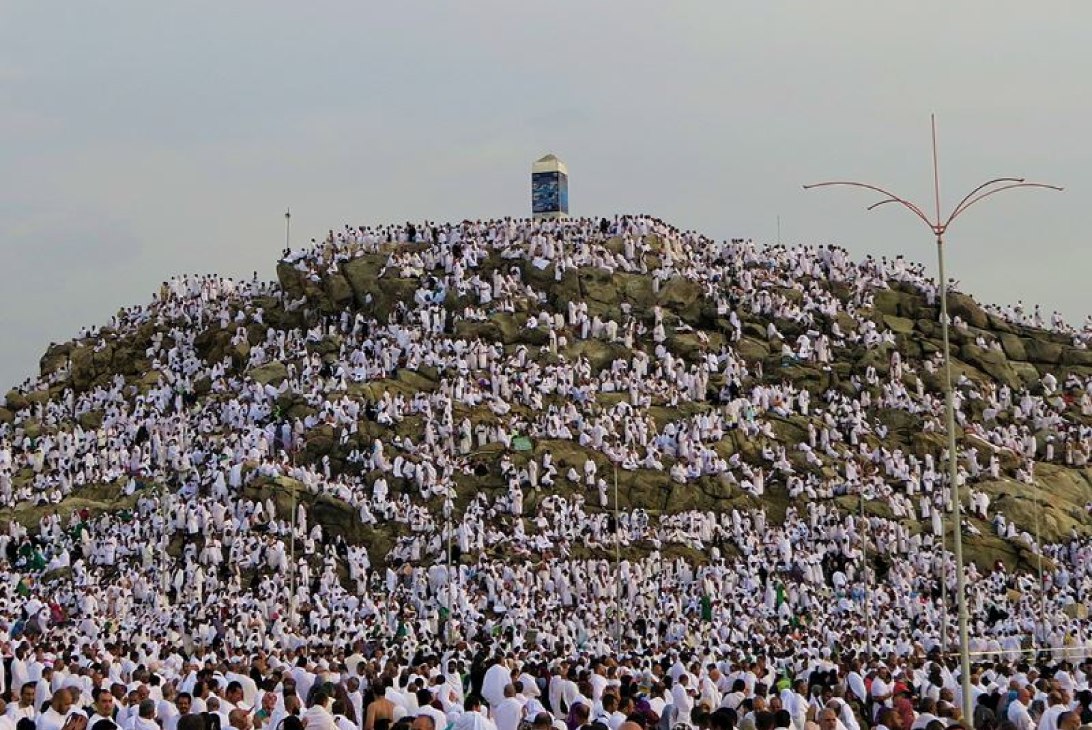يَـٰٓأَيُّهَا النَّاسُ اتَّقُوْا رَبَّكُمْ إِنَّ زَلْزَلَةَ السَّاعَةِ شَىْءٌ عَظِيْمٌ ، يَوْمَ تَرَوْنَهَا تَذْهَلُ كُلُّ مُرْضِعَةٍ عَمَّآ أَرْضَعَتْ وَتَضَعُ كُلُّ ذَاتِ حَمْلٍ حَمْلَهَا وَتَرَى النَّاسَ سُكَـٰرَىٰ وَمَا هُمْ بِسُكَـٰرَىٰ وَلَـٰكِنَّ عَذَابَ اللهِ شَدِيْدٌ
O humanity! Fear your Lord, for the quaking at the Hour is surely a dreadful thing. The Day you will see it, every nursing mother will abandon what she is nursing, and every pregnant woman will deliver her foetus (prematurely). And you will see people as if they are drunk, though they will not be drunk; but the torment of Allah is (terribly) severe. (22:1-2)
- These are the opening āyāt of Sūrah al-Ḥajj. At first glance, it may seem unusual that they contain such vivid and terrifying descriptions of the Final Day. However, there is a profound connection between ḥajj and the hereafter. One of the primary aims of ḥajj is to increase your īmān in the hereafter. Many of the stations and rites of ḥajj serve as direct reminders of the Day of Judgement.
- Subsequent āyāt in this sūrah also pertain to the hereafter.
- Constantly thinking about and prioritising the hereafter is the key to success. On the other hand, being heedless of it is one of the root causes of all sin.
Reflect: Does your current lifestyle reflect a focus on this world or the hereafter?
إِنَّ الَّذِيْنَ كَفَرُوْا وَيَصُدُّوْنَ عَنْ سَبِيْلِ اللهِ وَالْمَسْجِدِ الْحَرَامِ الَّذِىْ جَعَلْنَـٰهُ لِلنَّاسِ سَوَآءً الْعَـٰكِفُ فِيْهِ وَالْبَادِ وَمَنْ يُّرِدْ فِيْهِ بِإِلْحَادٍ بِظُلْمٍ نُّذِقْهُ مِنْ عَذَابٍ أَلِيْمٍ
Indeed, (We will punish) those who persist in disbelief and prevent (others) from the way of Allah and from al-Masjid al-Ḥarām (the Sacred Mosque) — which We have made for all people, where residents and visitors are all equal. Whoever intends to deviate by doing wrong in it, We will cause them to taste a painful punishment. (22:25)
- The gravity and punishment of a sin are multiplied due to the sanctity of both place and time.
- In the sacred ḥaram, even the mere intention to sin is punishable, unlike elsewhere. This highlights the immense respect and reverence you should carry for the ḥaram in your heart.
وَإِذْ بَوَّأْنَا لِإِبْرَٰهِيْمَ مَكَانَ الْبَيْتِ أَنْ لَّا تُشْرِكْ بِىْ شَيْـًٔا وَّطَهِّرْ بَيْتِىَ لِلطَّآئِفِيْنَ وَالْقَآئِمِيْنَ وَالرُّكَّعِ السُّجُوْدِ
And (remember) when We designated for Ibrāhīm the site of the House [i.e. Kaʿbah], (saying,) “Do not associate anything with Me as My partner, and purify My House for those who do ṭawāf, stand (in ṣalāh), and bow and prostrate themselves. (22:26)
:لَّا تُشْرِكْ بِى شَيْـًٔا
- The first thing Ibrāhīm (ʿalayhis-salām) is commanded to do is stay away from shirk. The Kaʿbah was built so that Allah Alone could be worshipped. Similarly, the purpose of ḥajj is to strengthen your tawḥīd: affirming the Oneness of Allah and worshipping Him Alone.
:طَهِّرْ بَيْتِىَ
purify My House
- This includes both spiritual and physical purification: cleansing the House of Allah from figurative filth such as shirk, disbelief, and sins, as well as from physical impurities.
Reflect: How can you act upon both the ‘spiritual’ and ‘physical’ purification? Think of a specific example for each one.
:بَيْتِىَ
Ibn al-Qayyim (raḥimahullāh) explains that hearts are deeply drawn to the Kaʿbah. People are willing to sacrifice their wealth and sometimes even their lives to make this sacred journey. People in the past would travel very far and the journey would be full of difficulties. Even now, people save up for many years to get a glimpse of the Ka’bah. The secret behind this deep love lies in the fact that Allah ﷻ has attributed this House to Himself: “Baytī: My House.”
:لِلطَّآئِفِينَ وَٱلْقَآئِمِينَ وَٱلرُّكَّعِ ٱلسُّجُودِ
for those who do ṭawāf, stand (in ṣalāh), and bow and prostrate themselves
- Part of honouring the ḥaram is to fill your time there with the acts of worship mentioned in this āyah: ṭawāf, qiyām, rukūʿ and sujūd.
Act: Do as much ṭawāf as you can, and pray plenty of ṣalāh in al-Masjid al-Ḥarām.
وَأَذِّنْ فِى النَّاسِ بِالْحَجِّ يَأْتُوْكَ رِجَالًا وَّعَلَىٰ كُلِّ ضَامِرٍ يَّأْتِيْنَ مِنْ كُلِّ فَجٍّ عَمِيْقٍ
Proclaim the pilgrimage (ḥajj) to all people. They will come to you on foot and on every lean camel, travelling through every distant hilly pathway. (22:27)
- When Allah ﷻ asked Ibrāhīm (ʿalayhis-salām) to announce the call for ḥajj to all people, Ibrāhīm (ʿalayhis-salām) asked, “O Lord, how can my voice reach all the people?” Allah ﷻ replied, “’Make an announcement, and it is upon Me to convey.” So Ibrāhīm (ʿalayhis-salām) climbed Mount Abū Qubays and proclaimed: “O people, your Lord has commanded you to perform ḥajj of this House, so that He may reward you with Paradise and protect you from Hell-fire. So, perform ḥajj.”
- Allah ﷻ instructed Ibrāhīm (ʿalayhis-salām) to make the announcement, thousands of years ago, long before the age of social media or even telephone lines. Yet, his call was preserved and conveyed. Today, you recite this āyah along with millions of others. This teaches you that you must take the necessary means and leave the outcome with Allah. If you are sincere in your efforts to convey Allah’s message, ash-Shakūr (The Most Appreciative) will multiply your actions in ways beyond your imagination.
Act: Do your best to convey the truth like Ibrāhīm (ʿalayhis-salām). Think of how he made this one call, and how many billions responded to it. What will you do to convey the message of Islam?
:ضَامِرٍ
- While the wealthy honour their guests with luxurious transport, Allah ﷻ praises His guests for arriving on worn-out, weary animals.
:يَأْتِينَ
travelling
The pronoun here refers to the camels. Just as the horses of jihād are honoured in Sūrah al-ʿĀdiyāt, the camels of ḥajj are honoured in this āyah.
لِّيَشْهَدُوْا مَنَـٰفِعَ لَهُمْ وَيَذْكُرُوا اسْمَ اللهِ فِىٓ أَيَّامٍ مَّعْلُومَـٰتٍ عَلَىٰ مَا رَزَقَهُمْ مِّنْ بَهِيْمَةِ الْأَنْعَـٰمِ فَكُلُوْا مِنْهَا وَأَطْعِمُوا الْبَآئِسَ الْفَقِيْرَ
so they may obtain the benefits (in store) for them, and remember the Name of Allah on appointed days over the sacrificial animals He has provided for them. So eat from them and feed the distressed, the poor. (22:28)
:مَنَـٰفِعَ لَهُمْ
the benefits (in store) for them
- Every action of ḥajj brings immense benefits. When you truly understand the countless rewards ḥajj offers, you will be eager to perform every part of it with excellence. You won’t seek shortcuts or concessions.
- The word مَنَـٰفِعَ is general and includes both the benefits of this world and the hereafter.
Reflect: How does this link with 2:198 mentioned in the previous section?
- The benefits of ḥajj include spiritual, political, economic, social and educational benefits. They extend to the individual, the ummah and humanity at large. All these benefits are connected to the ultimate purpose: worshipping Allah Alone. What does this tell you about the beauty of Islam?
Reflect: Allah is telling you there are many benefits. How are you going to benefit from ḥajj?
:وَأَطْعِمُوا۟ ٱلْبَآئِسَ ٱلْفَقِيرَ
and feed the distressed, the poor
- Ṣadaqah is an integral part of ḥajj. Allah instructs you to feed ٱلْبَآئِسَ, someone whose poverty is evident through their appearance, and ٱلْفَقِيرَ, someone who may not appear outwardly poor but is still in need.
ثُمَّ لْيَقْضُوْا تَفَثَهُمْ وَلْيُوْفُوْا نُذُوْرَهُمْ وَلْيَطَّوَّفُوْا بِالْبَيْتِ الْعَتِيْقِ
Then, they must remove their dirt fulfill their vows, and make ṭawāf of the Ancient House.” (22:29)
:ثُمَّ لْيَقْضُوا۟ تَفَثَهُمْ
Then, they must remove their dirt
- They should remove their dirt by shaving or trimming their hair, cutting the nails, trimming the moustache etc.
- When you’re getting your hair shaved, bathing and perfuming yourself, think of how you can purify your heart. Doing this will allow you to achieve the greater objective of ḥajj and return as pure from sin as the day you were born.
Reflect: What diseases of the heart (e.g. envy, pride, hatred, anger) do you most struggle with?
ذَٰلِكَ وَمَنْ يُّعَظِّمْ حُرُمَـٰتِ اللهِ فَهُوَ خَيْرٌ لَّهُۥ عِنْدَ رَبِّهِۦ وَأُحِلَّتْ لَكُمُ الْأَنْعَـٰمُ إِلَّا مَا يُتْلَىٰ عَلَيْكُمْ فَاجْتَنِبُوا الرِّجْسَ مِنَ الْأَوْثَـٰنِ وَاجْتَنِبُوْا قَوْلَ الزُّوْرِ
That is so. And whoever honours the things sanctified by Allah, it is best for them in the sight of their Lord. The (meat of) cattle has been made lawful for you, except what has been recited to you. So shun the filth of the idols, and shun words of falsehood. (22:30)
:ذَٰلِكَ وَمَن يُعَظِّمْ حُرُمَـٰتِ ٱللَّهِ فَهُوَ خَيْرٌ لَّهُۥ عِندَ رَبِّهِۦ
That is so. And whoever honours the things sanctified by Allah, it is best for them in the sight of their Lord
- Honouring the حُرُمَـٰتِ [the things sanctified by Allah] = Honouring Allah Himself.
- حُرُمَـٰتِ refers to everything that has sanctity and is commanded to be respected, such as all the rites of ḥajj, the ḥaram, the state of iḥrām, sacrificial offerings, and all acts of worship that Allah has commanded His servants to uphold.
وَٱجْتَنِبُوا۟ قَوْلَ ٱلزُّورِ
and shun words of falsehood
- Stay away from all unlawful speech, including false testimony and lying.
حُنَفَآءَ لِلّٰهِ غَيْرَ مُشْرِكِيْنَ بِهِۦ وَمَنْ يُّشْرِكْ بِاللهِ فَكَأَنَّمَا خَرَّ مِنَ السَّمَآءِ فَتَخْطَفُهُ الطَّيْرُ أَوْ تَهْوِىْ بِهِ الرِّيْحُ فِىْ مَكَانٍ سَحِيْقٍ
Be upright (in devotion) to Allah, not associating any partner with Him. Whoever associates partners with Allah is like someone who has fallen from the sky, and is either snatched away by birds or swept by the wind to a remote place. (22:31)
– Ḥunafā’ is the plural of ḥanīf. Ibrāhīm (as) is described as ḥanīfam-muslimā; his path is known as ḥanīfiyyah. A ḥanīf is someone who fully turns to Allah, devotes themselves entirely to His worship, and abandons everything else.
– This āyah contains a complex similitude in which Allah likens the polytheist to the one who brought upon himself an inescapable disaster:
- The sky symbolises the loftiness, honour, and vastness of īmān and tawḥīd.
- Falling from the sky represents a person abandoning īmān.
- Birds tearing at his flesh and limbs signify devils snatching pieces of his heart and dīn.
- Winds sweeping him away refer to desires dragging him down and distancing him from the heights of īmān.
– Tawḥīd elevates, while shirk brings one down. When someone abandons īmān and the protection it brings, the devils tear at him from every direction. They pull him apart and ruin both his dīn and dunyā.
“Notice the deep inner turmoil — a kind of psychological earthquake — that shakes the hearts of disbelievers. A sense of devastation fills their lives, and a crushing despair stifles their dreams, all because they lack true knowledge of Allah. In contrast, the life of a Muslim is filled with vastness and mercy, because knowing Allah opens up vast horizons for understanding life, the universe, and one’s ultimate destiny.” – Dr Farīd al-Anṣārī (raḥimahullāh)
ذَٰلِكَ وَمَنْ يُّعَظِّمْ شَعَـٰٓئِرَ اللهِ فَإِنَّهَا مِنْ تَقْوَى الْقُلُوْبِ
Whoever honours the symbols of Allah — indeed, it is from the piety of hearts. (22:32)
- Honouring the symbols of Allah is from taqwā. If you wish to be from the people of taqwā, you must honour and respect the symbols of Allah. The symbols of Allah include the Kaʿbah, Ṣafā and Marwah, uḍḥiyah, the adhān, jumuʿah etc.
- Taqwā has been attributed to the heart in this āyah. The Prophet ﷺ said: “Taqwā is here, taqwā is here, taqwā is here,” whilst pointing to his chest (Muslim). For taqwā to manifest in your actions, it must first be firmly established in the heart.
- The best form of taʿẓīm (reverence) is obeying Allah’s commands and shunning His prohibitions, especially in these sacred places and times.
ٱلْقُلُوبِ
the hearts
- The outer physical acts of worship should be the means to attaining the inner ‘actions of the heart’. ʿUbūdiyyah is the foundation of the millah (way) of Ibrāhīm (ʿalayhis-salām). ʿUbūdiyyah is complete submission, humility, love and sincerity — all actions of the heart.
لَكُمْ فِيْهَا مَنَـٰفِعُ إِلَىٰٓ أَجَلٍ مُّسَمًّى ثُمَّ مَحِلُّهَآ إِلَى الْبَيْتِ الْعَتِيْقِ
There are benefits for you in (the sacrificial animals) up to a specified time, then their place of sacrifice is at the Ancient House (the area of ḥaram). (22:33)
لَكُمْ فِيهَا مَنَـٰفِعُ إِلَىٰٓ أَجَلٍ مُّسَمًّى
There are benefits for you in (the sacrificial animals) up to a specified time
- ‘For you’: From His mercy, Allah has made the duties He placed upon you full of immense blessings and benefits.
- The benefits are for a ‘specified time’. Everything in this world is temporary. So don’t become too attached to the world.
:ٱلْبَيْتِ ٱلْعَتِيقِ
the Ancient House
The sanctified area of ḥaram is referred to in the Qur’ān by the words ‘al-Kaʿbah, al-Bayt al-ʿAtīq and al-Masjid al-Ḥarām’ indicating the sacredness of the entire area of the ḥaram, not just the Kaʿbah itself.

